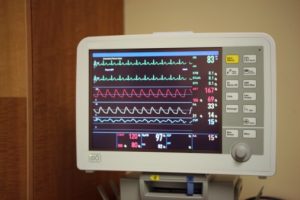 If you’ve ever listened to anybody’s heartbeat (including your own), it probably sounded similar to “lub-dub, lub-dub.” A heartbeat – or heart rate – signals life and is a strong indication of health as well.
If you’ve ever listened to anybody’s heartbeat (including your own), it probably sounded similar to “lub-dub, lub-dub.” A heartbeat – or heart rate – signals life and is a strong indication of health as well.
In a healthy individual a normal resting heart rate – when they are still and not in motion – should range between 60 and 100 beats per minute (bpm).
Advertisement
A lower heart rate is typically seen as being healthier and is more commonly seen in athletes.
Aside from indicating the function of your heart, new findings reveal that your heart rate can be a predictor of another serious health problem as well.
Heart rate linked with diabetes risk
Published in the International Journal of Epidemiology, researchers found that individuals with a faster heart rate were more likely to develop diabetes. For the study, the researchers examined more than 73,000 individuals and data from nearly 98,000 other individuals cited in previous research.
In their review they found that having a faster heart rate was linked with an increased risk of developing diabetes (a 58 percent increase) – this in comparison to individuals with slower heart rates. Although it is still unclear if diabetes leads to a faster heart rate or a fast heart rate leads to diabetes, the study unveils an association nonetheless. Even though a normal resting heart rate can go as high as 100 bpm, researchers suggest if you are at rest and your heart rate is at 85 or higher, you should probably speak with your doctor.
How to check for resting heart rate
 Of course, if you own or have access to a blood pressure monitor you can easily monitor your resting heart rate digitally. If not, there is still an easy method to check your resting heart rate.
Of course, if you own or have access to a blood pressure monitor you can easily monitor your resting heart rate digitally. If not, there is still an easy method to check your resting heart rate.
The first step is to locate your pulse – common areas of access are your neck or your wrist. Count the number of beats you feel in a 15-second time period and multiply the number by four.
Keep in mind that heart rate changes based on activity, so if you just ran up some stairs or were in motion, it will naturally be higher than if you were just sitting in front of the TV. For the most accurate results ensure you check your resting heart rate when you are actually at rest.
Conditions linked with heart rate
Advertisement
Aside from revealing a potential risk of diabetes, your heart rate could be a signifier for other conditions as well. Abnormal heart rates or arrhythmia can be a sign of an electrical problem in the heart. Heart rate is regulated by an electrical system, and if there are problems with that system, it can contribute to an irregular or abnormal heart rate.
There are different types of arrhythmias – some more severe than others. Below is a list of arrhythmias your doctor may diagnose you with.
- Atrial fibrillation
- Atrial flutter
- Sick sinus syndrome
- Sinus tachycardia
- Ventricular tachycardia
- Ventricular fibrillation
- Premature contractions
- Long QT syndrome
If you’re concerned about your heart rate, visit your doctor to perform an electrocardiogram and properly measure your heart rate.
